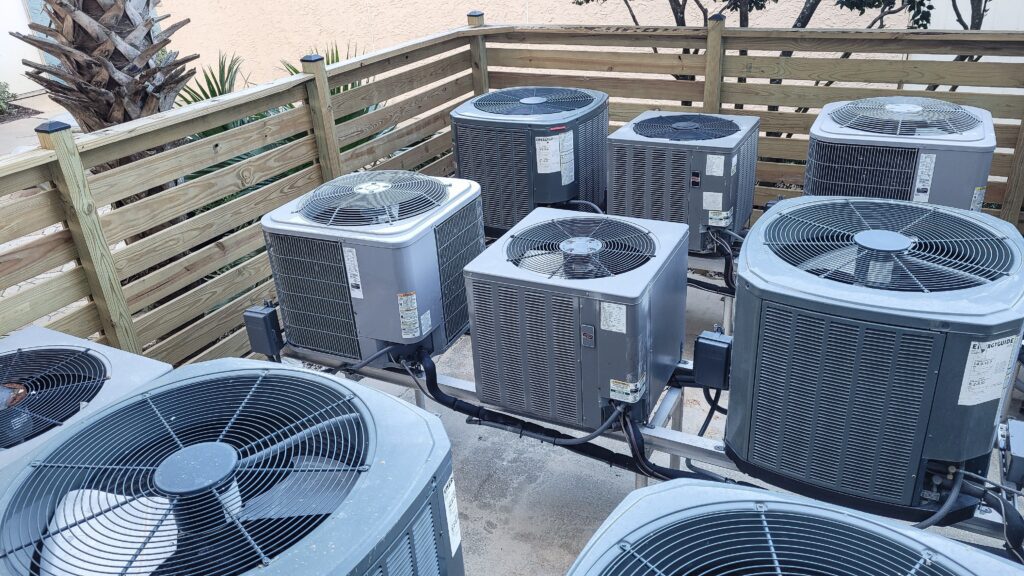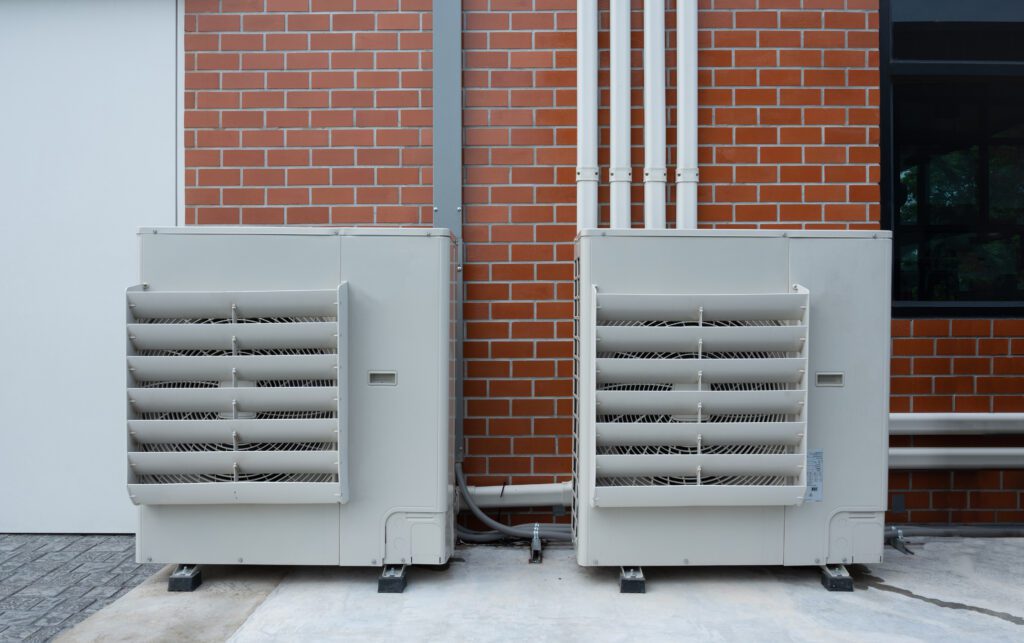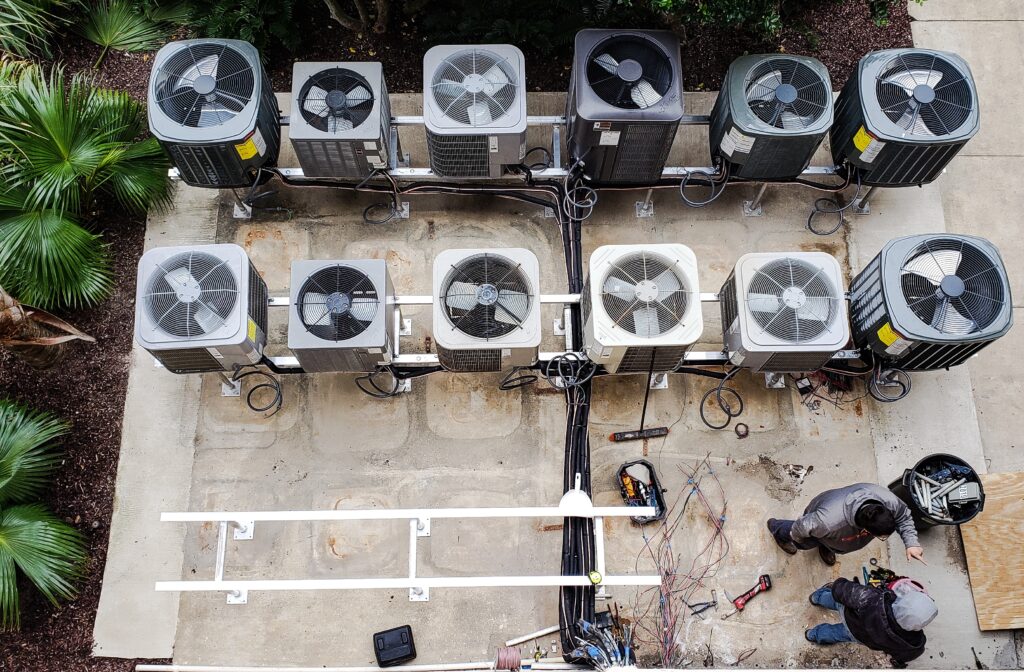Importance of a sustainable HVAC system for businesses
Choosing a sustainable HVAC system for your business is important for reducing energy consumption and environmental impact. These systems are designed to operate efficiently, using less energy and reducing greenhouse gas emissions. By investing in a sustainable HVAC system, businesses can save on energy costs and contribute to a greener environment. Additionally, sustainable HVAC systems often require less maintenance, which can result in long-term cost savings for businesses.
Understanding the key components of a sustainable HVAC system
Sustainable HVAC systems consist of several key components that work together to reduce energy consumption and minimize environmental impact. These components include high-efficiency HVAC equipment, advanced air filtration systems, programmable thermostats, and energy recovery ventilation. By understanding the role of each component, businesses can make informed decisions to select an HVAC system that aligns with their sustainability goals and effectively regulates indoor air quality.
Assessing your business’s HVAC needs
When considering an HVAC system for your business, it’s important to assess your specific needs to find the most suitable option. Here are some key factors to consider:
- Size of the Space: Evaluate the square footage of your business to determine the appropriate capacity needed for heating and cooling.
- Energy Efficiency: Look for HVAC systems with high energy efficiency ratings to reduce operational costs and minimize environmental impact.
- Environmental Impact: Consider the environmental impact of the HVAC system, such as its carbon footprint and use of eco-friendly refrigerants.
- Maintenance Requirements: Assess the maintenance needs of different HVAC systems to ensure smooth and cost-effective operation in the long run.
- Budget: Determine a budget for the initial investment as well as ongoing operational costs to select a sustainable HVAC system that aligns with your financial resources.
Researching energy-efficient HVAC options

Energy-efficient HVAC systems can help businesses reduce their energy consumption and lower utility bills. When researching options, consider factors such as the system’s Energy Star rating, which indicates its energy efficiency. Look for systems with advanced features like variable-speed technology, which helps optimize energy usage. Additionally, explore renewable energy sources like geothermal heating and cooling systems, which can further improve the sustainability of your HVAC system. Compare the initial costs with the long-term energy savings to make an informed decision that aligns with your business’s sustainability goals.
Budgeting for a sustainable HVAC system
It’s important to budget for a sustainable HVAC system for your business to ensure that you can invest in the right equipment for your needs. The cost of sustainable HVAC systems can vary widely based on factors such as the size of your space, the type of system you choose, and the energy efficiency ratings. Here are a few key points to consider when budgeting for a sustainable HVAC system:
- Sustainable HVAC systems may have a higher upfront cost compared to traditional systems, but they can provide long-term savings on energy bills and maintenance costs.
- Energy-efficient options like variable refrigerant flow (VRF) systems or geothermal heat pumps may have higher initial costs but can provide significant energy savings over time.
- It’s important to consider the return on investment (ROI) when budgeting for a sustainable HVAC system. Look at how much you can save on energy costs over the lifespan of the system.
- You may also be eligible for incentives, rebates, or tax credits for choosing a sustainable HVAC system, which can help offset the initial cost.
Consider working with a qualified HVAC professional to assess your business’s needs and develop a budget that aligns with your sustainability goals.
Comparing different sustainable HVAC technologies
When comparing sustainable HVAC technologies, it’s important to consider factors like energy efficiency, environmental impact, and long-term costs. Here are a few key points to keep in mind:
- Energy Efficiency: Look for HVAC systems with high SEER (Seasonal Energy Efficiency Ratio) ratings, as they indicate better energy performance.
- Environmental Impact: Consider technologies that utilize eco-friendly refrigerants and minimize greenhouse gas emissions.
- Long-Term Costs: Evaluate the overall lifecycle costs, including installation, maintenance, and energy expenses, to determine the most cost-effective option for your business.
By prioritizing these factors, you can make a well-informed decision when choosing a sustainable HVAC system for your business.
Choosing the right HVAC system for your business

When choosing an HVAC system for your business, it’s essential to consider factors like the size of your space, the energy efficiency of the system, and the environmental impact. A sustainable HVAC system can help reduce energy consumption, lower utility costs, and minimize your business’s carbon footprint. Additionally, investing in a high-quality HVAC system can contribute to a comfortable and productive work environment for your employees.
Hiring a professional HVAC contractor
When hiring a professional HVAC contractor, it’s important to ensure they are qualified and experienced in commercial HVAC systems. Look for certifications and licenses, and ask about their experience with sustainable HVAC systems. Make sure to request references and check their reviews to ensure they have a good track record. It’s also crucial to discuss your specific needs and requirements with the contractor to ensure they can provide the right solution for your business.
Installation and maintenance considerations
When choosing a sustainable HVAC system for your business, it’s important to consider both the installation and maintenance aspects. Here are some key points to keep in mind:
- Proper installation of the HVAC system is essential for maximizing its efficiency and lifespan.
- Regular maintenance is crucial for ensuring the system continues to operate at peak performance while minimizing energy consumption.
- Additionally, selecting a system with easily accessible components can make maintenance and repairs more convenient and cost-effective.
Evaluating the long-term benefits of a sustainable HVAC system
When considering a sustainable HVAC system for your business, it is important to evaluate the long-term benefits. Sustainable systems can contribute to significant cost savings over time through reduced energy consumption and maintenance costs. Additionally, they can help minimize your business’s environmental impact and improve overall air quality. Conducting a thorough cost-benefit analysis and considering the potential return on investment before making a decision is crucial. Keep in mind that the initial investment in a sustainable HVAC system may be higher, but the long-term benefits often outweigh the upfront costs. Look for energy-efficient models that are designed to provide reliable performance while minimizing environmental impact.



